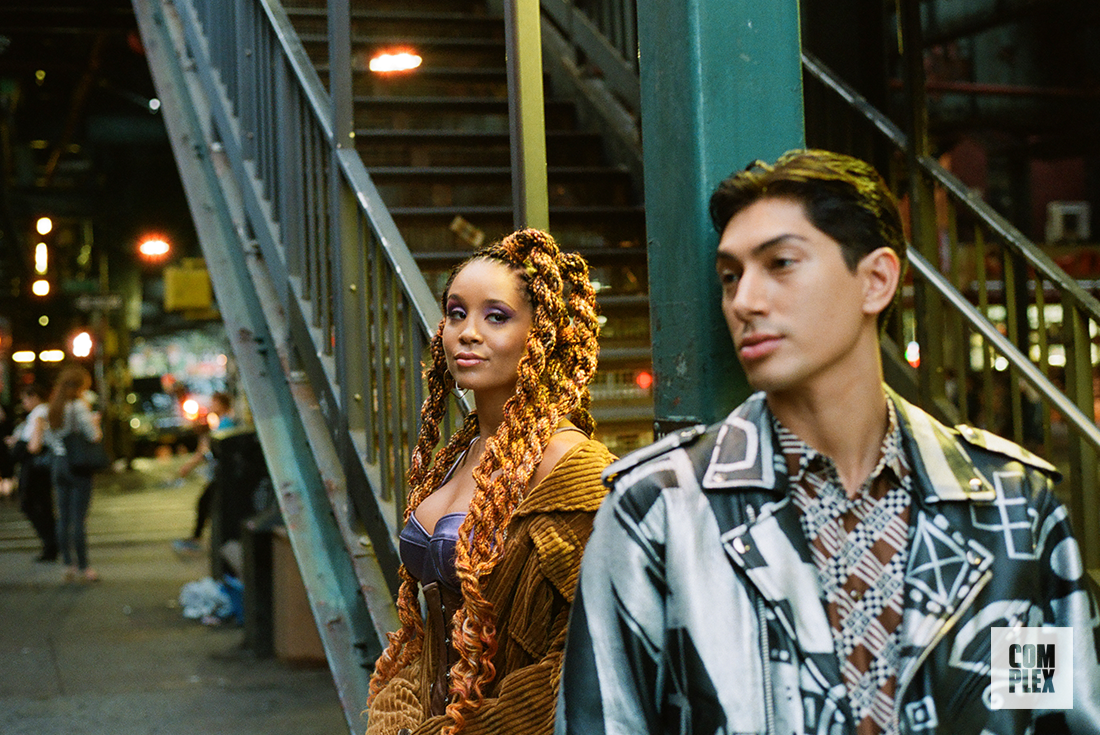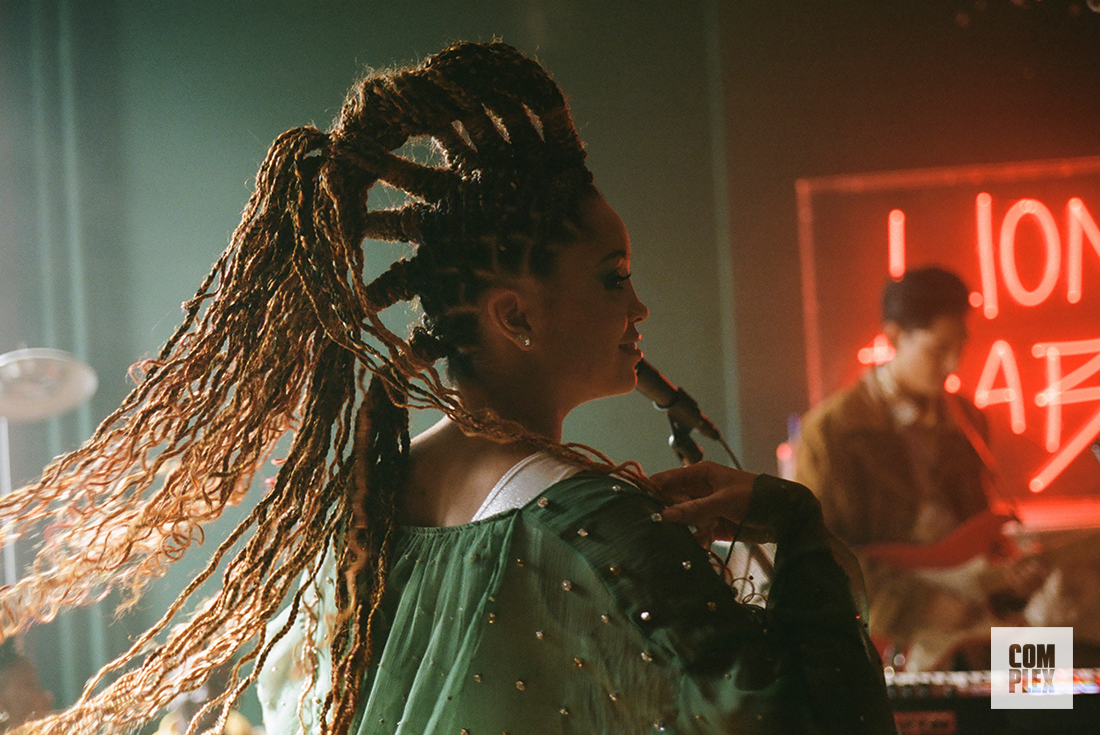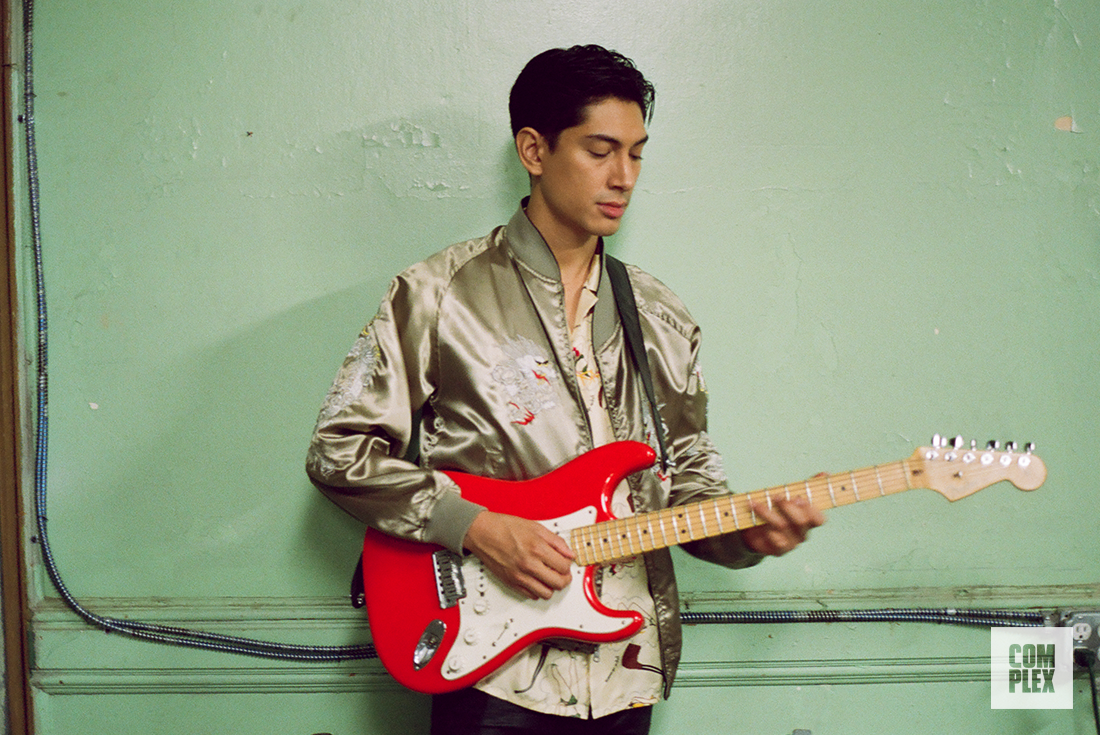
Don’t be surprised if you find it hard sitting still while listening to Lion Babe. Dance is a huge part of the soul duo, which is made up of singer-songwriter Jillian Hervey’s soulful vocals and producer Lucas Goodman’s funk-soul beats. The pair agree that the group wouldn’t exist in its current form without the influence of dance. In fact, Goodman says, “Jill’s movement is definitely what attracts a lot of people to [Lion Babe].”
Today Hervey and Goodman are at a 100-year-old church in downtown Brooklyn, where they’ll pose for pictures and, in between takes, field questions about their career. Hervey, sitting upright with enviable posture, shares how she’s poured much of her life into dance—training since the age of two and hasn’t stopped since. Throughout her youth the 29-year-old was immersed in everything from modern, ballet, the Martha Graham technique, and competitive dance. She attributes her confidence with singing, performing and, well, existing, to this intensive background. “It was the thing that made me feel like I have an identity,” says Hervey.
Her fluid, confident movement is part of the reason for the success of Lion Babe’s first single, 2012’s “Treat Me Like Fire” and its accompanying music video. The song was an immediate hit and remains their most recognizable track. The video features Hervey dancing under pulsating lights, while her hair loose and curly (“that was the goddess version of me”) frames her face like a lion’s mane.
“We could have just put the song out and it definitely would have been a cool song,” Goodman says. “But I think when people saw Jill moving, they were like, ‘What is this, what's going on here?’”
“Treat Me Like Fire” was only the second thing the pair had done together. The first was a track Goodman produced for a dance piece that Hervey was choreographing. Although both members of Lion Babe hail from New York, they actually met by chance during a college party in Boston. At the time, Hervey was a senior in high school visiting Northeastern where Goodman was attending college. Captivated by one of the songs blasting through the speakers, Hervey asked around to find out who was controlling the AUX cord. She was told that the kid with the long hair sitting on the couch produced the track. That kid, or course, was Goodman.
Even after being introduced that night, the future bandmates wouldn’t speak again for another five years when they were both back in New York and were re-acquainted through mutual friends. Bonding over their mutual love for music, they eventually decided to hit the studio together. “One day I was just playing some beats for Jill and she started singing along to it,” Goodman remembers. “I was like, ‘That sounds great, we should record that real quick.’ The rest is history, as they say.”

The success of the independently-released “Treat Me Like Fire” led to record deal, which catapulted Lion Babe to the forefront of the pop consciousness. In the years since, they’ve collaborated with everyone from Childish Gambino, Disclosure, and Mark Ronson; received co-signs from Rick Ross and Pharrell; and toured with the Roots. Earlier this year, Lion Babe played Coachella for the first time and wrote an original song for the most recent season of HBO’s Insecure, at the special request of the show’s creator/star Issa Rae.
Lion Babe’s warped-speed rise has been exciting but has also offered plenty of its own challenges. The success that followed “Treat Me Like Fire” didn’t leave Goodman and Hervey much time to figure out their own voice before they were forced to navigate the ins and outs of the music industry. “We just wanted it to work so bad, and it was working and it was hard, but we just put everything into [Lion Babe] and that was the only part of our lives for a minute,” Hervey explains. “It’s almost like we needed that time to just build a bunch of things, so that we knew what we really want to say, and what is really us within all of this.”
At first, Hervey says she found the industry’s fixation on maintaining a characteristic look challenging, especially when it came to her hair. She didn’t feel that her lioness identity was solely limited to her hairstyle, but it seemed that everyone else did. “It got to the point where I'm like, ‘If I shaved my head tomorrow, would you even want me to be singing,’” says Hervey. “‘Do you even care about my voice, or is it my look?’”

“If I shaved my head tomorrow, would you even want me to be singing? Do you even care about my voice, or is it my look.”
Hervey doesn’t feel as much pressure to box herself in as she used to. She now sees her hair as a tool of expression and fun extension of who she is. In fact, today her loose curls are braided and piled on top of her head in a Mohawk that reaches all the way down her back. “It’s just been freeing to try absolutely everything and anything that I want.”
This outlook extends to other areas as well. Almost six years after their first hit, an EP, and one full length album later, Hervey and Goodman say they’ve found their voice and are more driven than ever to get it out into the world. They’re focused on making music that is adventurous and experimental, while still being uniquely Lion Babe. A large part of that comes from Hervey’s voice, which is often compared to the likes of Josephine Baker, Grace Jones, Lauryn Hill, and Billie Holiday. Goodman grew up surrounded by music; he played guitar in high school and worked as a solo producer going by the name Astro Raw before Lion Babe. His neo-pop-soul beats that underpin Hervey’s vocals are inspired by everyone from J Dilla to the Strokes to Blondie.
“We just put everything into [Lion Babe] and that was the only part of our lives for a minute.”
If dance is what gives Lion Babe their confidence, New York City is what feeds their creativity. Goodman was born and raised on the Lower East Side, where he still lives now. Hervey grew up in Chappaqua, a fairly homogeneous suburb further up the Hudson River best known for being home to the Clintons and not much else. She moved to Manhattan to attend college at the New School for dance and was immediately inspired by the vibrance and diversity of the city.
“Just being surrounded by all different walks of life, all different people, all different colors, ages, genders,” she says. “Just everything was out in the open and people weren't judging each other in that way.”
This is where the soulfulness of Lion Babe’s music comes from. “You can feel it and it moves and it takes you places,” Hervey continues. “You can be walking down the street, and you're feeling a type of way, and then you bump right into your friend, and then your night changes. Even if it's hard here, it is so uplifting, it's so magical. I think that's the dynamic we try to also bring with the music, that spirit.”

So what’s next for the pair? Goodman has begun playing live instruments alongside Hervey during performances, including a memorable extended guitar solo during their Coachella show earlier this year. And Hervey is once again cultivating her various passions outside of music—directing, dancing, and writing are all on the horizon. But what the duo is most excited about is releasing their second full-length album. They’ve spent the last two years working on still-untitled project and hope to drop it sometime in 2019. They just moved into their own brand new studio, where, for the first time, they have a place to create music together without the distractions of the outside world.
“I feel we’re definitely doing our own thing,” Goodman says. “By blindly giving with full faith, doing whatever we naturally feel first, the more we go deeper into that and try not to get thrown off by other things going on outside. I think that's what's helping us succeed more and more.”

